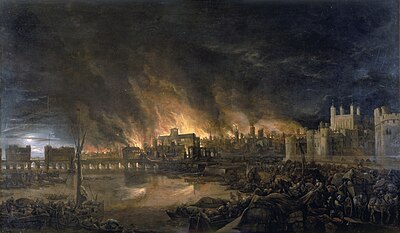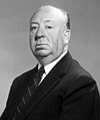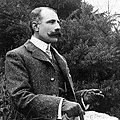Portal:England
The England portal

| |
England is a country that is part of the United Kingdom. It is located on the island of Great Britain, of which it covers about 62%, and more than 100 smaller adjacent islands. It has land borders with Scotland to the north and Wales to the west, and is otherwise surrounded by the North Sea to the east, the English Channel to the south, the Celtic Sea to the south-west, and the Irish Sea to the west. Continental Europe lies to the south-east, and Ireland to the west. At the 2021 census, the population was 56,490,048. London is both the largest city and the capital.
The area now called England was first inhabited by modern humans during the Upper Paleolithic. It takes its name from the Angles, a Germanic tribe who settled during the 5th and 6th centuries. England became a unified state in the 10th century and has had extensive cultural and legal impact on the wider world since the Age of Discovery, which began during the 15th century. The Kingdom of England, which included Wales after 1535, ceased to be a separate sovereign state on 1 May 1707, when the Acts of Union brought into effect a political union with the Kingdom of Scotland that created the Kingdom of Great Britain.
England is the origin of the English language, the English legal system (which served as the basis for the common law systems of many other countries), association football, and the Anglican branch of Christianity; its parliamentary system of government has been widely adopted by other nations. The Industrial Revolution began in 18th-century England, transforming its society into the world's first industrialised nation. England is home to the two oldest universities in the English-speaking world: the University of Oxford, founded in 1096, and the University of Cambridge, founded in 1209. Both universities are ranked among the most prestigious in the world.
England's terrain chiefly consists of low hills and plains, especially in the centre and south. Upland and mountainous terrain is mostly found in the north and west, including Dartmoor, the Lake District, the Pennines, and the Shropshire Hills. The London metropolitan area has a population of 14.2 million as of 2021, representing the United Kingdom's largest metropolitan area. England's population of 56.3 million comprises 84% of the population of the United Kingdom, largely concentrated around London, the South East, and conurbations in the Midlands, the North West, the North East, and Yorkshire, which each developed as major industrial regions during the 19th century. (Full article...)

The Great Fire of London was a major conflagration that swept through central London from Sunday 2 September to Thursday 6 September 1666, gutting the medieval City of London inside the old Roman city wall, while also extending past the wall to the west. The death toll is generally thought to have been relatively small, although some historians have challenged this belief.
The fire started in a bakery in Pudding Lane shortly after midnight on Sunday 2 September, and spread rapidly. The use of the major firefighting technique of the time, the creation of firebreaks by means of removing structures in the fire's path, was critically delayed due to the indecisiveness of the Lord Mayor, Sir Thomas Bloodworth. By the time large-scale demolitions were ordered on Sunday night, the wind had already fanned the bakery fire into a firestorm which defeated such measures. The fire pushed north on Monday into the heart of the City. Order in the streets broke down as rumours arose of suspicious foreigners setting fires. The fears of the homeless focused on the French and Dutch, England's enemies in the ongoing Second Anglo-Dutch War; these substantial immigrant groups became victims of street violence. On Tuesday, the fire spread over nearly the whole city, destroying St Paul's Cathedral and leaping the River Fleet to threaten Charles II's court at Whitehall Palace. Coordinated firefighting efforts were simultaneously getting underway. The battle to put out the fire is considered to have been won by two key factors: the strong east wind dropped, and the Tower of London garrison used gunpowder to create effective firebreaks, halting further spread eastward. (Full article...)
Selected article -
Cambridge (/ˈkeɪmbrɪdʒ/ ⓘ KAYM-brij) is a city and non-metropolitan district in the county of Cambridgeshire, England. It is the county town of Cambridgeshire and is located on the River Cam, 55 miles (89 km) north of London. As of the 2021 United Kingdom census, the population of the City of Cambridge was 145,700; the population of the wider built-up area (which extends outside the city council area) was 181,137. Cambridge became an important trading centre during the Roman and Viking ages, and there is archaeological evidence of settlement in the area as early as the Bronze Age. The first town charters were granted in the 12th century, although modern city status was not officially conferred until 1951.
The city is well known as the home of the University of Cambridge, which was founded in 1209 and consistently ranks among the best universities in the world. The buildings of the university include King's College Chapel, Cavendish Laboratory, and the Cambridge University Library, one of the largest legal deposit libraries in the world. The city's skyline is dominated by several college buildings, along with the spire of the Our Lady and the English Martyrs Church, and the chimney of Addenbrooke's Hospital. Anglia Ruskin University, which evolved from the Cambridge School of Art and the Cambridgeshire College of Arts and Technology, also has its main campus in the city. (Full article...)
General images
Berkhamsted Castle is a Norman motte-and-bailey castle in Berkhamsted, Hertfordshire. The castle was built to obtain control of a key route between London and the Midlands during the Norman conquest of England in the 11th century. Robert of Mortain, William the Conqueror's half brother, was probably responsible for managing its construction, after which he became the castle's owner. The castle was surrounded by protective earthworks and a deer park for hunting. The castle became a new administrative centre of the former Anglo-Saxon settlement of Berkhamsted. Subsequent kings granted the castle to their chancellors. The castle was substantially expanded in the mid-12th century, probably by Thomas Becket.
The castle was besieged in 1216 during the civil war between King John and rebellious barons, who were supported by France. It was captured by Prince Louis, the future Louis VIII, who attacked it with siege engines for twenty days, forcing the garrison to surrender. After being retaken by royal forces the subsequent year, it was given to Richard, Earl of Cornwall, beginning a long association with the Earldom of Cornwall and the later duchy. Richard redeveloped the castle as a palatial residence, and made it the centre of the earldom's administration. King Edward III further developed the castle in the 14th century and gave it to his son, Edward, the Black Prince, who expanded the hunting grounds. The castle was also used to hold royal prisoners, including King John II of France and rival claimants to the English throne. (Full article...)
Did you know?
- ...that the HMS Queen (1902) was fitted with Babcock and Wilcox cylindrical boilers due to service problems with the water service boilers?
- ...that the Charter Roll is the administrative record created by the medieval office of the chancery that recorded all the charters issued by the chancery?
- ...that Canterbury in eastern Kent was abandoned at the end of the Roman period, but was resettled by the Saxons?
- ...that English singer-songwriter Robbie Williams has sold more albums in the United Kingdom than any other British solo artist in history?
In the news

- 29 January 2025 – Expansion of Heathrow Airport
- UK Chancellor of the Exchequer Rachel Reeves approves the construction of a third runway at Greater London's Heathrow Airport after decades of delays. (Sky News)
- 23 January 2025 – 2024 Southport stabbing
- A court in Liverpool, England, sentences the man who was found guilty of killing three children and injuring 10 others in a mass stabbing in Southport, Merseyside, to life imprisonment with a minimum of 52 years in prison. (DW)
- 22 January 2025 – Hunt family murders
- Kyle Clifford, the perpetrator of the Hunt family killings in Bushey, England, in 2024, pleads guilty to three counts of murder. (BBC News)
- 20 January 2025 – 2024 Southport stabbing
- Axel Rudakubana pleads guilty to all 16 charges, including three charges of murder in relation to a mass stabbing in Southport, Merseyside, England, in July 2024. Rudakubana is expected to be sentenced on Thursday. (ITV News)
- 18 January 2025 – Gaza war protests
- More than 70 people are arrested at a pro-Palestine protest in London, England, United Kingdom for violating protest regulations. (BBC News)
Selected featured content
Categories
Selected quotes
| “ | Do not be misled by memories of your youth when, on the Continent, wanting to describe someone as exceptionally dull, you remarked: 'He is the type who would discuss the weather with you.' In England this is an ever-interesting, even thrilling topic, and you must be good at discussing the weather. | ” |
Related WikiProjects
England • Bedfordshire • Brighton • Cheshire • Cornwall • Derbyshire • Dorset • Greater Manchester • Hampshire • Lincolnshire • London • Merseyside • Northamptonshire • North East England • Sheffield • Surrey. Warwickshire • West Midlands • Worcestershire • Yorkshire
Topics
Things you can do

- Please visit the English Wikipedians' notice board and help to write new England-related articles, and expand and improve existing ones.
- Visit Wikipedia:WikiProject England/Assessment, and help out by assessing unrated English articles.
- Add the Project Banner to English articles around Wikipedia.
- Check for announcements and open tasks for ways to improve English related articles.
- Help nominate and select new content for the England portal.
- Requested articles: Charterhouse Lane • Renewable energy in England • Ealing Village
- Expand: Dorothy Boyd • David Troughton
Related Portals
 |
 |
 |
 |
 |
 |
 |
 |
| East Midlands | London | North East | North West | South East | South West | West Midlands | Yorkshire and the Humber |

|

|

|

|

|
| Ireland | Northern Ireland | Scotland | United Kingdom | Wales |
Associated Wikimedia
The following Wikimedia Foundation sister projects provide more on this subject:
-
Commons
Free media repository -
Wikibooks
Free textbooks and manuals -
Wikidata
Free knowledge base -
Wikinews
Free-content news -
Wikiquote
Collection of quotations -
Wikisource
Free-content library -
Wikiversity
Free learning tools -
Wikivoyage
Free travel guide -
Wiktionary
Dictionary and thesaurus






































![Image 35The Staffordshire Hoard is the largest hoard of Anglo-Saxon gold and silver metalwork yet found[update]. It consists of almost 4,600 items and metal fragments. (from Culture of England)](http://upload.wikimedia.org/wikipedia/commons/thumb/6/60/Staffordshire_hoard_annotated.jpg/120px-Staffordshire_hoard_annotated.jpg)

































































